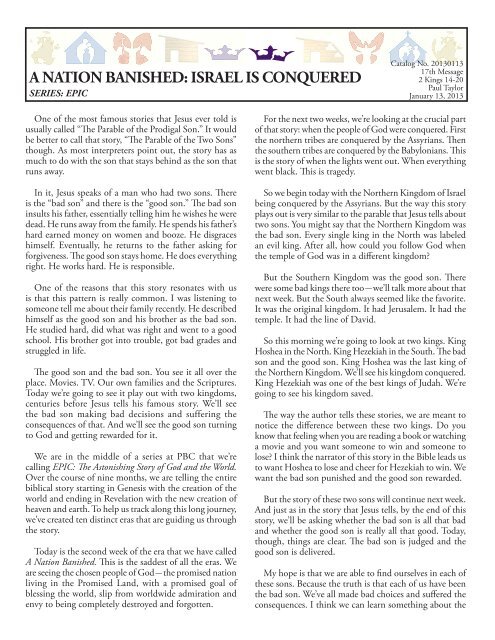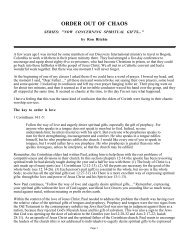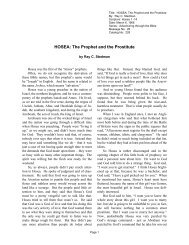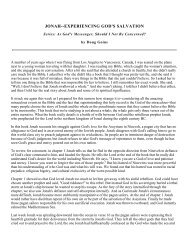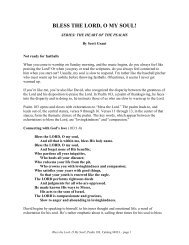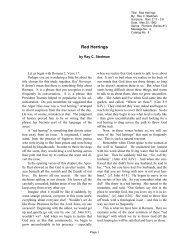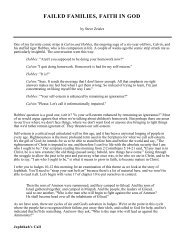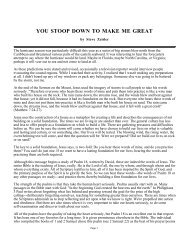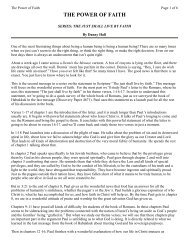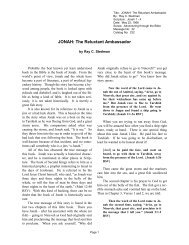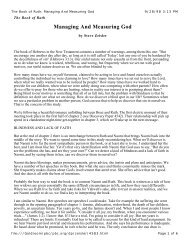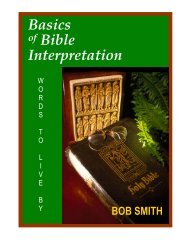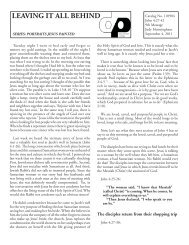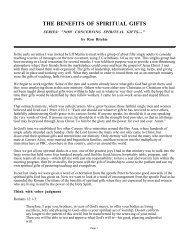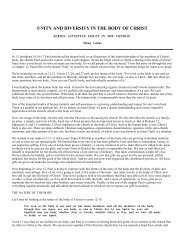20130113 WEB Format.indd - Peninsula Bible Church
20130113 WEB Format.indd - Peninsula Bible Church
20130113 WEB Format.indd - Peninsula Bible Church
You also want an ePaper? Increase the reach of your titles
YUMPU automatically turns print PDFs into web optimized ePapers that Google loves.
judgment of God. But we also have the potential to bethe good son. We can turn to God in times of crisis anddoubt. And we can see God show up in amazing ways.However, as in the story Jesus tells, when we get to theend of this story, I think we’ll see that it might not evenbe about the sons at all.The bad son is judgedWe’ll start where the story in 2 Kings starts: by lookingat the bad son. This is King Hoshea—not to be confusedwith the prophet Hosea. Here’s the account of himbecoming king.2 Kings 17:1-6:1In the twelfth year of Ahaz king of Judah,Hoshea son of Elah became king of Israel inSamaria, and he reigned nine years. 2 He did evilin the eyes of the LORD, but not like the kingsof Israel who preceded him.3Shalmaneser king of Assyria came up toattack Hoshea, who had been Shalmaneser’svassal and had paid him tribute. 4 But the king ofAssyria discovered that Hoshea was a traitor, forhe had sent envoys to So king of Egypt, and heno longer paid tribute to the king of Assyria, ashe had done year by year. Therefore Shalmaneserseized him and put him in prison. 5 The kingof Assyria invaded the entire land, marchedagainst Samaria and laid siege to it for threeyears. 6 In the ninth year of Hoshea, the kingof Assyria captured Samaria and deported theIsraelites to Assyria. He settled them in Halah,in Gozan on the Habor River and in the townsof the Medes.Hoshea was a bad king, but not as bad as some. He “didevil in the eyes of the LORD,” but not like the kings beforehim. This account of his reign is interesting that it is soshort. He was, after all, the last king to rule in Samaria.You’d think there might be more drama when the northerntribes of Israel were destroyed by the Assyrians. But therewasn’t. It’s just, Hoshea was king—he did evil—the kingof Assyria put him in prison and carried off all his people.That’s it.There are two ways to explain why the NorthernKingdom was conquered. There are political reasons andthere are theological reasons.Politically, the nation was a mess. Lots of bad kingsmeans lots of unhappy people. On top of that, Assyriato their east was becoming a world power and devouringnations as they came closer and closer to Israel. Severalkings before Hoshea finally had to sell out to Assyria andstart paying money to avoid being conquered.When Hoshea became king, he decided he wanted tostop doing that. He thought Egypt would come help himout. So he didn’t write the check. But Egypt didn’t come.Instead, angry Assyrians came. They lay siege to the capitalcity of Samaria, eventually conquered it, put Hoshea inprison, and carried off all of the people into foreign lands.There are usually earthly explanations for why mostthings happen. But they aren’t the only explanations. Don’tforget about God. Ultimately, the <strong>Bible</strong> reveals that he isbehind all these political and economic explanations. Atthe end of the day, Israel didn’t fall for political reasons.It fell for theological reasons. Listen to the reason the<strong>Bible</strong> gives for why Israel was conquered. Listen to theseexcerpts.2 Kings 17:7-8:7All this took place because the Israeliteshad sinned against the LORD their God,who had brought them up out of Egypt fromunder the power of Pharaoh king of Egypt.They worshiped other gods 8 and followed thepractices of the nations the LORD had drivenout before them, as well as the practices thatthe kings of Israel had introduced.2 Kings 17:13-17:13The LORD warned Israel and Judahthrough all his prophets and seers: “Turnfrom your evil ways. Observe my commandsand decrees, in accordance with the entire Lawthat I commanded your fathers to obey andthat I delivered to you through my servantsthe prophets.”14But they would not listen and were as stiffneckedas their fathers, who did not trust in theLORD their God. 15 They rejected his decreesand the covenant he had made with theirfathers and the warnings he had given them.They followed worthless idols and themselvesbecame worthless. They imitated the nationsaround them although the LORD had orderedthem, “Do not do as they do,” and they did thethings the LORD had forbidden them to do.16They forsook all the commands of theCatalog No. <strong>20130113</strong> page 2
LORD their God and made for themselves twoidols cast in the shape of calves, and an Asherahpole. They bowed down to all the starry hosts,and they worshiped Baal. 17 They sacrificed theirsons and daughters in the fire. They practiceddivination and sorcery and sold themselves todo evil in the eyes of the LORD, provokinghim to anger.The Assyrians conquered Israel because Israel had“sinned against the Lord their God.” That’s it. The reasonwhy God judged the bad son is because he had walkedaway from God. That’s all. Step by step God’s people hadwalked away from him.Now, I want you to stop and think about what it meantthat God’s people had walked away from him. It wasn’tjust a religious problem. They hadn’t just become badJews. They had become bad people. Just this week I sawa news article on an Indian woman in the UK who hadmurdered her son and burned his body because he failedto memorize some portions of the Koran. This woman wastried in court and sentenced to life in jail for the murder.That is a terrible thing.This is what the Israelites were doing. This was theirreligious observance. The god they worshipped calledMolech demanded the highest possible sacrifice that youcould offer in that culture. The most valuable thing youpossessed. What was that? Your oldest son. So to pleaseMolech and guarantee good fortune, you would offer yourchild to a basin in a bronze statue that was filled with fire.Your child would burn to death. Your wives would watch.Your other children would watch. Can you even imagine?Incidentally, if you enjoy fiction, I just read a book overbreak called Gods and Kings by Lynn Austin. It’s a historicalfiction about King Hezekiah who we will look at next. Thebook opens with an account of Hezekiah watching hisolder brother being sacrificed to Molech. It’s a terrifyingscene. It helped me to realize how real this is. It’s not justa list of sins in 2 Kings. It’s a terrible, unthinkable actionthat would be prosecuted with life in prison today.The people in the North hadn’t always been this terrible.They got there step by step. For two hundred years, therehad been spiritual decisions that brought these peoplefurther and further away from God. It started with makingworship more convenient, then by covering all their basesand worshipping other gods, and then other steps. Finally,at the end, they were sacrificing their little boys and forcingtheir little girls into religious prostitution.So what does God do when his people start acting likethis? He judges them. The prophet Amos says this, “Look,Catalog No. <strong>20130113</strong> page 3I am setting a plumb line among my people Israel; I willspare them no longer” (Amos 7:9). 2 Kings 17:18 says,“So the LORD was very angry with Israel and removedthem from his presence.” God used the Assyrian armiesto judge his people.These are tough words to read. Doesn’t God love hispeople? Why would a loving God do these things? Howcould he judge his people so harshly? When we read aboutGod’s judgment, for the most part it frightens us. We don’tlike to think about a God that judges. We’d much ratherthink about God’s love. But when we think that way weforget one important thing. Judgment is part of love. Youcan’t love if you don’t judge. They go together. Judgmentcomes from love.Let’s imagine two of my kids are playing baseball in thebackyard. They have a baseball T and are putting whiffleballs on it and swinging away. Now let’s imagine that theydecide it’s more fun to hit each other than the ball on theT. I look outside and I see each of them with a plasticbaseball bat swinging away, aiming for each other’s heads.If I’m a good parent, if I’m a loving parent what do I do?I go outside and I take their baseball bats and I say thatthey can’t play with these anymore today. I gave themsomething good and they were using it to hurt each other,so I took it away. I judge them and I take away the toolsof their evil.That’s what God did to his people. He gave them abunch of great things. He gave them a job to do andthe resources to do it. But they took their land and theirmoney and they hurt each other with it. They oppressedeach other. They sacrificed their kids. So he took thosethings away. He destroyed the high places. He ruined thesanctuaries. They abused the land he had given, so he saidthey couldn’t live there anymore. He did all of this throughthe hands of the Assyrians.Talking about God’s judgment makes us scared. But Iwant to suggest to us that we should be far more afraidof God’s apathy than his judgment. We want a God thatcares enough to watch what we’re doing and not let us gotoo far astray. What’s worse is a God that doesn’t care. AGod that lets his people do whatever they want to do. AGod that is too busy to notice his kids beating each otherwith baseball bats. Or a God that doesn’t exist at all.We should be thankful that we have a God who judges.But we also have a God who is patient. He could havewiped out the Northern Kingdom two centuries earlier.Instead, he kept giving them chances. He sent prophets.He called them back. Finally, he steps in and judges them.
and military strength—but you speak onlyempty words. On whom are you depending,that you rebel against me? 21 Look now, you aredepending on Egypt, that splintered reed of astaff, which pierces a man’s hand and woundshim if he leans on it! Such is Pharaoh king ofEgypt to all who depend on him. 22 And if yousay to me, “We are depending on the LORDour God”—isn’t he the one whose high placesand altars Hezekiah removed, saying to Judahand Jerusalem, “You must worship before thisaltar in Jerusalem”?23“‘Come now, make a bargain with mymaster, the king of Assyria: I will give youtwo thousand horses—if you can put riderson them! 24 How can you repulse one officer ofthe least of my master’s officials, even thoughyou are depending on Egypt for chariots andhorsemen? 25 Furthermore, have I come to attackand destroy this place without word from theLORD? The LORD himself told me to marchagainst this country and destroy it.’”is the same. Our culture tells us that faith in Jesus Christisn’t wrong, it’s just unimportant. It’s not even worthtalking about. If Ray Lewis had said something offensiveabout the team they had just played or made a racial sluror insulted someone, the interviewer would have beeninterested in that—because it would matter. But talkingabout God just doesn’t matter. So you don’t argue with it,you don’t acknowledge it, you just ignore it. You ignorethings that don’t matter.And that’s the challenge that is so prevalent in ourculture. Very few people openly mock faith in Christ, buteverywhere we get the message that faith in Christ doesn’tmatter. Believe if you want, don’t believe if you don’t want—it makes no difference.And in essence, that is exactly what this Assyrian generalwas saying in a more explicit way. He said that faith inYHWH isn’t any different than faith in any of the othergods that couldn’t save their people. Believing in YHWH isjust like believing in Baal or Molech or Asherah or anyoneelse. And in the face of the might of Assyria, believing inYHWH doesn’t matter.This is ancient near east trash talk at its best. Who doyou think your God is? Is he any different from any of theother gods that we destroyed? Take your best shot. YourGod can’t do anything to save you.I find this story really powerful because I think it hitshome. We live in a pretty “nice” culture that doesn’t reallymake fun of people too much. I haven’t experienced peoplemocking my faith in Christ like this. It’s far too direct forour culture. But I think what we experience in our cultureis closer to this than we realize.Last week after one of the football playoff games, therewas an interview with Ray Lewis from the BaltimoreRavens. He had just completed his last home game afteran incredible career and had returned after a difficultinjury. The interviewer was asking how he felt about hisaccomplishment. And the only thing Ray Lewis wantedto talk about was God. He was grateful to God, he wasconvinced of God’s plan for his career, and he gave all theglory to God.But you could tell the interviewer wasn’t interested inthat. She wanted him to talk about football and hard workand his teammates, not God. She kept asking questionstrying to get him to talk about something else and he justkept talking about God.These are the types of interactions that we have in ourculture. It’s not like the army general of Assyria makingfun of our God. It’s more subtle. But in reality, the messageCatalog No. <strong>20130113</strong> page 5When I have doubts, this is what I struggle with. I don’tget hung up on scientific contradictions. I don’t worryabout whether God exists. I hardly ever wonder whetherChristianity is true. But sometimes I wonder whetherit matters. Sometimes I get confused by the messageof our culture that faith in Christ isn’t wrong, it’s justunimportant.That’s why I love the story of Hezekiah. He is shakenby this trash talk. He is worried. So he goes to God. Hepours out his heart and he asks God to show up and deliverhim. He falls on his knees and he asks God to show theseAssyrians that YHWH is different from other Gods. Showthe world that YHWH matters.And God does. Big time.2 Kings 19:35:35That night the angel of the LORD wentout and put to death a hundred and eighty-fivethousand men in the Assyrian camp. When thepeople got up the next morning—there were allthe dead bodies!God proves himself. He is real. He is powerful. He isdifferent from other Gods. Belief in him matters. Andultimately, he will not be mocked. Here’s what we learnfrom Hezekiah’s story: Our God can’t be mocked.Our God will not be mocked. This isn’t the first time
we’ve seen this to be the case. We’ve seen it repeatedlythroughout the story we’ve been telling this year. WhenPharaoh refused to release God’s people from slavery,God showed up. He proved himself and humiliated theEgyptian gods who couldn’t stand against him. WhenGoliath mocked God, David said, “Who are you tochallenge the armies of the living God?” And Goliath wasdefeated. When the northern tribes mocked the prophetsof YHWH and replaced them with prophets of Baal, Godjudged them and sent them into exile.And here, a general of the Assyrian army mocks Godand loses most of his army. Later on in our story, God willbe mocked again. The son of God, who is God becomeman, will hang on a tree. He will be laughed at. He will bespit upon. They will yell at him, “If you really are the sonof God, then save yourself. Come down from that cross.”And he won’t respond.I always fi nd that incredible. Sometimes I think Ican understand Jesus enduring the pain, but not thehumiliation. How could he let himself be mocked?I think the answer is that he knew it wasn’t true. I’m apretty sensitive guy. There are lots of things that you couldsay to me that would hurt my feelings. But imagine youcome up to me after this service and say “Paul, you are soshort. You’re a shorty-shorty short. You’re so short!” Youwouldn’t hurt my feelings. Because it’s just not true. I’vegot plenty of insecurities. But I’m not insecure about beingshort because I know it isn’t true.That’s how Jesus endured being mocked. He knew itwasn’t true. Even though it seemed like it might be true.That’s called faith. That’s what I need more of. That’s whatwe need more of. We need to know that our God can’t bemocked. Then it won’t bother us when the people aroundus tell us that faith in Christ doesn’t matter. Because we’llbe convinced that it does.God humiliated Pharaoh and saved his people fromEgypt. David defeated Goliath. The northern tribes werejudged for walking away from God. The Assyrian armyat Jerusalem’s door was wiped out. And Jesus rose fromthe dead. Our God is different. He is real. He is powerful.Following him matters.Hoshea watches the Northern Kingdom get destroyed. Thebad son is judged. Hezekiah prays to God and is savedfrom destruction. The good son is delivered. We’ll see thisstory continue next week and we’ll find out somethingsurprising about the so-called good son.But really, this story isn’t about these two sons at all. Weare meant to contrast them: to see how different they are.But underneath all that, we are meant to see the same Godtreating each of them the same way: with love.God judges Hoshea and removes them from the landbecause they are hurting each other and need a time-out.God judges because of love. God delivers Hezekiah anddestroys his enemy because his people have turned backto him. God saves because of love.We started off thinking about the story Jesus told abouttwo sons. But that story isn’t really about the sons either.It’s really about the father. One father who loves both sonsequally. That’s what this story is about. It’s a difficult story,but behind it is a God who loves his people. That why hejudges. That’s why he saves.But what about when God doesn’t judge? What aboutwhen people get away with stuff? And what about whenhe doesn’t save? What about when terrible things happento people who cry out to God asking for deliverance?This is where the EPIC comes in. Our lives are livedas part of a larger picture. We can’t see how everythingconnects. God was merciful for many years before hejudged. And God allowed some really hard things tohappen before he saved. We don’t have the perspective tosee it all. But the story helps us to know what is happeningin the big picture when we are trapped by the limitedperspective of our individual lives.So even when we don’t see it, we can know that weworship a God who judges and a God who saves. Weworship a God that is strong. A God that is powerful. AGod that steps in. We worship a God who loves us: goodand bad sons alike.ConclusionThese two nations have played out the story of two sons.Discovery Publishing © 2013. Discovery Publishing is the publications ministry of <strong>Peninsula</strong> <strong>Bible</strong> <strong>Church</strong>. This message from the Scriptures was presented atPENINSULA BIBLE CHURCH, 3505 Middlefield Road, Palo Alto, CA 94306. Phone (650) 494-3840. www.pbc.orgScripture quotations are taken from HOLY BIBLE, NEW INTERNATIONAL VERSION NIV. Copyright © 1973, 1978, 1984 by International <strong>Bible</strong>Society. Used by permission of International <strong>Bible</strong> Society. All rights reserved worldwide.Catalog No. <strong>20130113</strong> page 6


